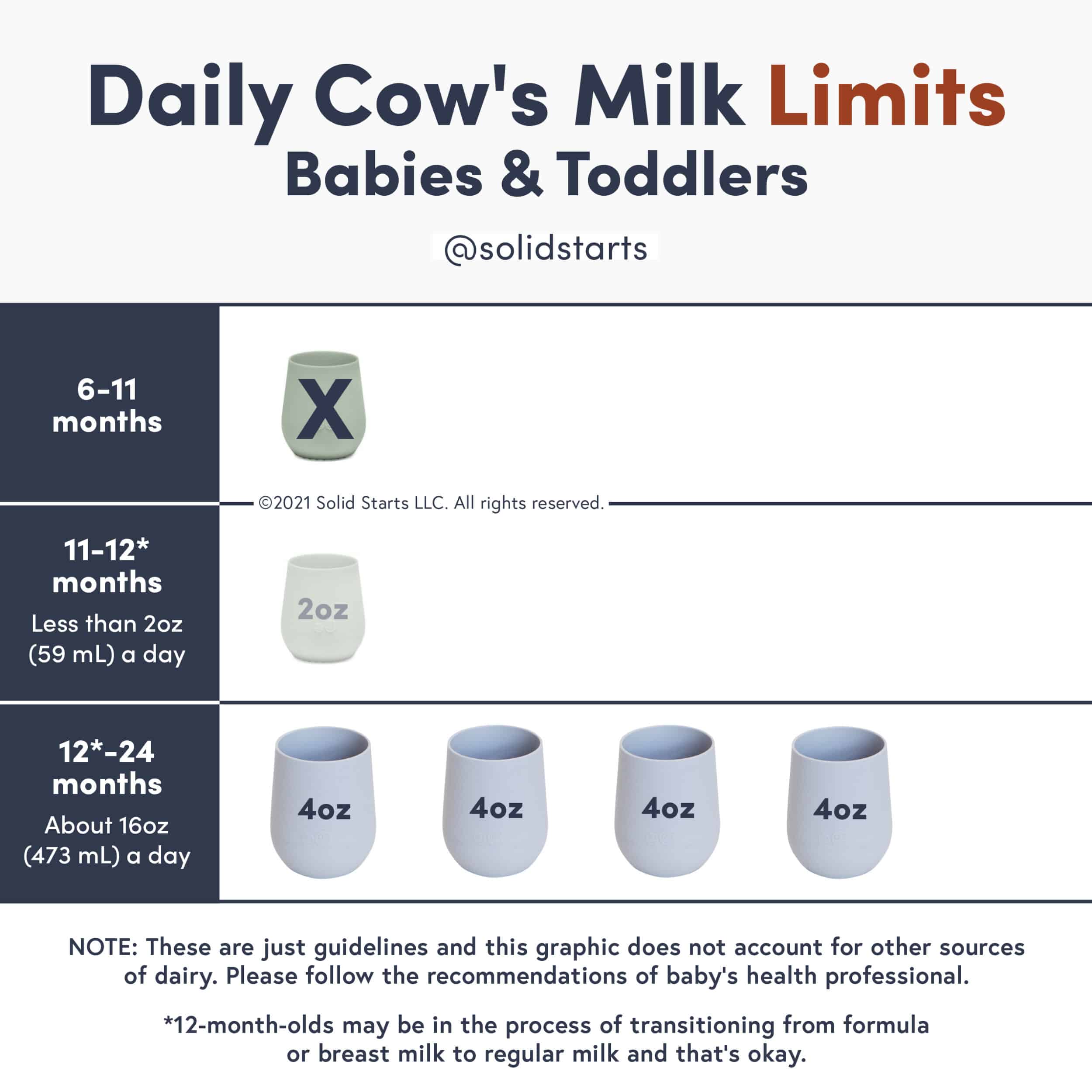You should not give your baby cow’s milk before they turn one year old. Breast milk or formula is recommended instead.
Introducing cow’s milk too early can lead to health issues for your baby. Cow’s milk lacks essential nutrients that infants need for growth and development. It can also be difficult for a baby’s digestive system to handle. Pediatricians recommend sticking to breast milk or infant formula for the first year.
After your baby turns one, you can start introducing whole cow’s milk into their diet. This ensures they get the necessary nutrients and can digest it properly. Always consult your pediatrician before making any changes to your baby’s diet to ensure their health and well-being.

Credit: www.cdc.gov
Introduction To Cow’s Milk For Babies
Introducing cow’s milk to babies is a common milestone. Parents often wonder if their baby is ready. The decision involves understanding its benefits and any concerns.
Importance Of Milk In Early Development
Milk plays a crucial role in a baby’s growth. It provides essential nutrients like calcium and vitamin D. These nutrients are vital for bone development.
Cow’s milk also contains protein, which helps build muscles. Babies need fat for brain development. Cow’s milk contains healthy fats to support this.
Here is a table showing the important nutrients found in cow’s milk:
| Nutrient | Importance |
|---|---|
| Calcium | Bone development |
| Vitamin D | Bone health |
| Protein | Muscle growth |
| Fat | Brain development |
Common Concerns Among Parents
Parents have many questions about cow’s milk. One common concern is allergies. Some babies may be allergic to cow’s milk protein. Symptoms include rashes, vomiting, and diarrhea.
Lactose intolerance is another issue. Some babies can’t digest lactose, the sugar in milk. This can cause stomach pain and gas.
Here are some tips for introducing cow’s milk:
- Start with small amounts.
- Mix cow’s milk with breast milk or formula.
- Watch for any allergic reactions.
- Consult your pediatrician.
Remember to always monitor your baby. Ensure they are comfortable with the new milk.

Credit: solidstarts.com
When To Introduce Cow’s Milk
Introducing cow’s milk to your baby is an important milestone. Knowing the right time is crucial for their health. Let’s explore the ideal age and signs of readiness.
Ideal Age To Start
Most experts recommend introducing cow’s milk at 12 months. Before this, babies need breast milk or formula. These provide essential nutrients for growth.
After 12 months, you can start with whole milk. Whole milk contains fats vital for brain development. Avoid low-fat milk before age 2.
| Age | Milk Type |
|---|---|
| 0-12 months | Breast milk or formula |
| 12-24 months | Whole cow’s milk |
| 2+ years | Low-fat or skim milk |
Signs Of Readiness
Look for signs your baby is ready for cow’s milk. These signs ensure they can digest it well.
- They eat a variety of solid foods.
- They drink from a cup.
- They show no signs of milk allergy.
If your baby meets these criteria, they may be ready. Introduce cow’s milk slowly. Mix it with breast milk or formula at first.
Nutritional Benefits Of Cow’s Milk
Cow’s milk is a popular choice for many parents. It is rich in essential nutrients. But is it suitable for your baby?
Key Nutrients
Cow’s milk contains several key nutrients that support growth:
- Calcium: Essential for strong bones and teeth.
- Protein: Helps in muscle development and repair.
- Vitamin D: Supports calcium absorption and bone health.
- Vitamin B12: Crucial for brain development and nerve function.
- Potassium: Important for heart and muscle function.
Comparison With Breast Milk And Formula
| Nutrient | Cow’s Milk | Breast Milk | Formula |
|---|---|---|---|
| Protein | 3.4g per 100ml | 1.1g per 100ml | 1.3g per 100ml |
| Calcium | 120mg per 100ml | 34mg per 100ml | 60mg per 100ml |
| Vitamin D | 1 IU per 100ml | 1 IU per 100ml | 1-2 IU per 100ml |
| Iron | 0.03mg per 100ml | 0.07mg per 100ml | 1mg per 100ml |
As shown, cow’s milk has more protein and calcium than breast milk. It lacks iron compared to formula. This might affect your baby’s nutritional needs.
Potential Risks And Allergies
Introducing cow’s milk to your baby can pose some risks. Babies may face issues like lactose intolerance or milk allergies. Understanding these potential risks helps in making informed choices.
Lactose Intolerance
Some babies cannot digest lactose, a sugar in milk. This condition is called lactose intolerance. Symptoms include:
- Diarrhea
- Bloating
- Gas
- Stomach cramps
If your baby shows these signs, consult a pediatrician. They may suggest lactose-free milk options.
Milk Allergies
Milk allergies are different from lactose intolerance. Allergies involve the immune system. Symptoms can be more severe and include:
- Rashes
- Hives
- Vomiting
- Swelling of the lips, face, or throat
Severe reactions can lead to anaphylaxis, a life-threatening condition. Immediate medical attention is crucial if such symptoms appear.
| Condition | Symptoms | Actions |
|---|---|---|
| Lactose Intolerance | Diarrhea, Bloating, Gas, Stomach cramps | Consult pediatrician, consider lactose-free options |
| Milk Allergies | Rashes, Hives, Vomiting, Swelling | Seek immediate medical help |
Proper Ways To Introduce Cow’s Milk
Introducing cow’s milk to your baby is a significant step. It is essential to do this properly to ensure your baby’s health and nutrition. Here are some effective methods for a smooth transition.
Gradual Introduction
A gradual introduction is crucial to help your baby adapt. Start by mixing small amounts of cow’s milk with breast milk or formula. This will allow your baby to get used to the taste.
- Begin with a ratio of 1 part cow’s milk to 3 parts breast milk or formula.
- After a week, increase to a 1:1 ratio.
- Eventually, transition to full cow’s milk over the course of a month.
Observe your baby for any signs of allergies or intolerance during this period. If you notice any issues, consult your pediatrician immediately.
Mixing With Other Foods
Another effective method is to mix cow’s milk with other foods. This can make the transition smoother and more enjoyable for your baby.
| Food | How to Mix with Cow’s Milk |
|---|---|
| Cereal | Mix cow’s milk with baby cereal for breakfast. |
| Mashed Fruits | Add a splash of cow’s milk to mashed bananas or apples. |
| Pureed Vegetables | Combine cow’s milk with pureed carrots or peas. |
Using cow’s milk in these ways helps your baby get used to its taste and texture. It also provides essential nutrients like calcium and vitamin D.
Remember, always use whole cow’s milk for babies under two years old. They need the extra fat for brain development.
Alternatives To Cow’s Milk
Finding alternatives to cow’s milk for your baby can be a challenge. Many parents seek healthier or allergy-friendly options. This section explores various substitutes for cow’s milk.
Plant-based Milks
Plant-based milks are popular among parents. These milks come from various plants and nuts.
- Almond Milk: Made from almonds, it’s low in calories and rich in vitamins.
- Soy Milk: High in protein, it’s a common cow’s milk alternative.
- Oat Milk: Creamy and sweet, it’s made from oats and is often fortified.
- Coconut Milk: Made from the meat of coconuts, it’s rich in healthy fats.
Fortified Options
Fortified milks have added vitamins and minerals. This makes them a great choice for growing babies.
| Type | Key Nutrients |
|---|---|
| Almond Milk | Calcium, Vitamin D, Vitamin E |
| Soy Milk | Protein, Calcium, Vitamin B12 |
| Oat Milk | Calcium, Vitamin D, Fiber |
| Coconut Milk | Calcium, Vitamin D, Magnesium |
These fortified options ensure your baby gets essential nutrients. Always check the label for added sugars.
Choosing the right milk for your baby can be important. Explore these alternatives and find the best fit for your child’s needs.
Consulting Healthcare Providers
Introducing cow’s milk to your baby is a significant decision. It’s crucial to consult healthcare providers before making any changes to your baby’s diet. This ensures your baby gets the right nutrients at the right time. Let’s explore why this step is so important and what questions you should ask.
Importance Of Professional Advice
Healthcare providers have the expertise to guide you. They understand your baby’s unique needs. Consulting them helps avoid potential allergies or digestive issues. They can provide a personalized plan based on your baby’s health.
Questions To Ask
When you visit your healthcare provider, prepare a list of questions. Here are some essential questions:
- Is my baby ready for cow’s milk?
- How should I introduce cow’s milk?
- What type of cow’s milk is best?
- Are there any signs of allergies I should watch for?
- How much cow’s milk should my baby consume daily?
Asking these questions ensures you cover all bases. It helps you make an informed decision about your baby’s diet. Remember, professional advice is invaluable for your baby’s growth and development.

Credit: www.unlockfood.ca
Frequently Asked Questions
What Happens If You Accidentally Give A Baby Cow’s Milk?
Giving a baby cow’s milk can cause digestive issues. It may lead to allergies, diarrhea, or nutrient imbalances. Breast milk or formula is recommended for infants. Always consult a pediatrician for advice.
Can I Give My 9 Month Old Milk Instead Of Formula?
No, it’s best to continue formula for your 9-month-old. Cow’s milk lacks essential nutrients for infants. Consult your pediatrician.
Can You Give A Baby Cow’s Milk In An Emergency?
Yes, but only temporarily. Cow’s milk lacks essential nutrients for infants. Consult a pediatrician as soon as possible.
Can I Put My 7 Month Old On Cow’s Milk?
No, it’s not recommended to give cow’s milk to a 7-month-old baby. Breast milk or formula is best.
Conclusion
Ensuring your baby gets proper nutrition is crucial. Cow’s milk can be introduced after their first birthday. Before that, breast milk or formula is best. Always consult your pediatrician for personalized advice. Understanding when and how to introduce cow’s milk can support your baby’s growth and development.
Stay informed and prioritize your child’s health.


